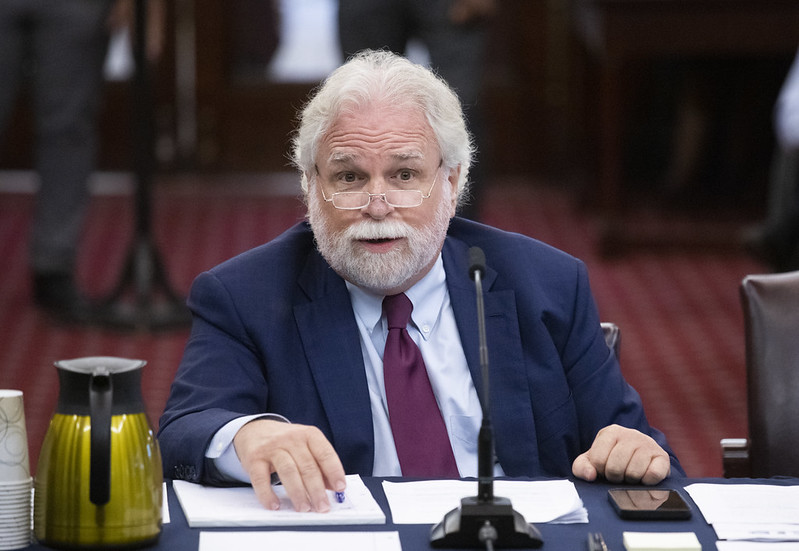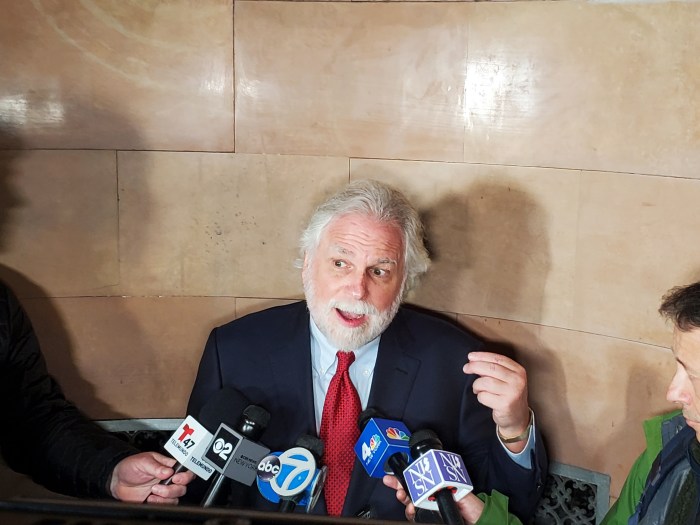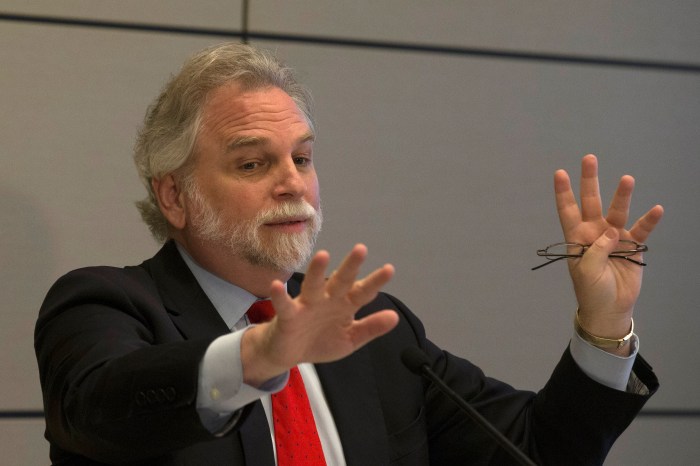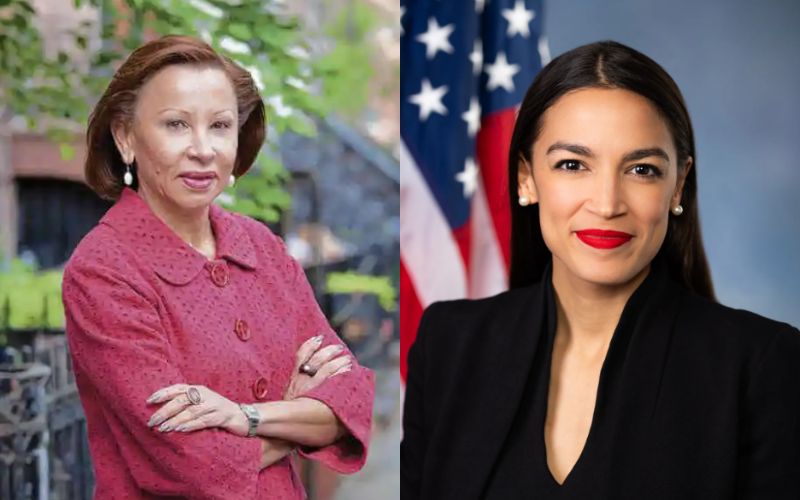Seasoned litigator Randy Mastro, Mayor Eric Adams’ pick to be the city’s next chief attorney, went through the wringer on Tuesday, fielding heated questions from City Council members during a contentious hours-long hearing.
During the proceeding, council members questioned Mastro’s moral character and values based on his time working for former GOP Mayor Rudy Giuliani in the 1990s and several of his past cases as a private attorney.
The City Council has approval power over the city’s top lawyer — a position known as corporation counsel — and is expected to vote on Mastro’s nomination during a meeting set for Sept. 14. The corporation counsel is the city’s attorney, overseeing the Law Department and representing the mayor, council, city comptroller, public advocate and the five borough presidents.
The sharp tone struck by several council members, along with their pointed lines of questioning, appeared to show what many already suspected — that Mastro’s nomination may be dead in the water.
Reviewing record with Giuliani
In many instances, council members invoked Mastro’s and the Giuliani administration’s past actions, which, they said, harmed Black and brown New Yorkers — including its use of so-called broken windows policing practices — and repeatedly spoke over him while he tried to answer questions.
Meanwhile, Mastro frustratedly fought back. He disputed many council members’ assertions about his record and often asked them to let him finish his points when they cut him off.
The hearing marked the chamber’s first and likely only chance to publicly ask Mastro about his legal approach and background as he vies to become the city’s top attorney. It was also the first time tensions over Mastro’s nomination, which have bubbled under the surface since his name was first floated for the position in April, erupted into public view.
Adams formally nominated Mastro for the position late last month, following the resignation of its last occupant — Sylvia Hinds-Radix — earlier in the summer.
A pair of influential City Council caucuses, representing 36 members between them, released statements opposing Mastro in the spring. They said his time working in former Mayor Rudy Giuliani’s administration, as a chief of staff and a deputy mayor, and several of his clients in private practice, including former GOP New Jersey Gov. Chris Christie, make him a poor match for the job.
Additionally, many council members have raised concerns that Mastro would act more as the mayor’s lawyer than the City Council’s — a notion he fiercely denies.
City Council Speaker Adrienne Adams opened the hearing by stating that being a highly experienced attorney does not necessarily mean a nominee is the best choice as corporation counsel.
“There are many experienced and effective lawyers in our great city, but any prospective corporation counsel must meet a high standard of commitment to public service and justice,” the speaker said. “They also need New Yorkers’ trust and must be accountable to the public and the many officials represented by the Law Department.”
‘I am my own man’
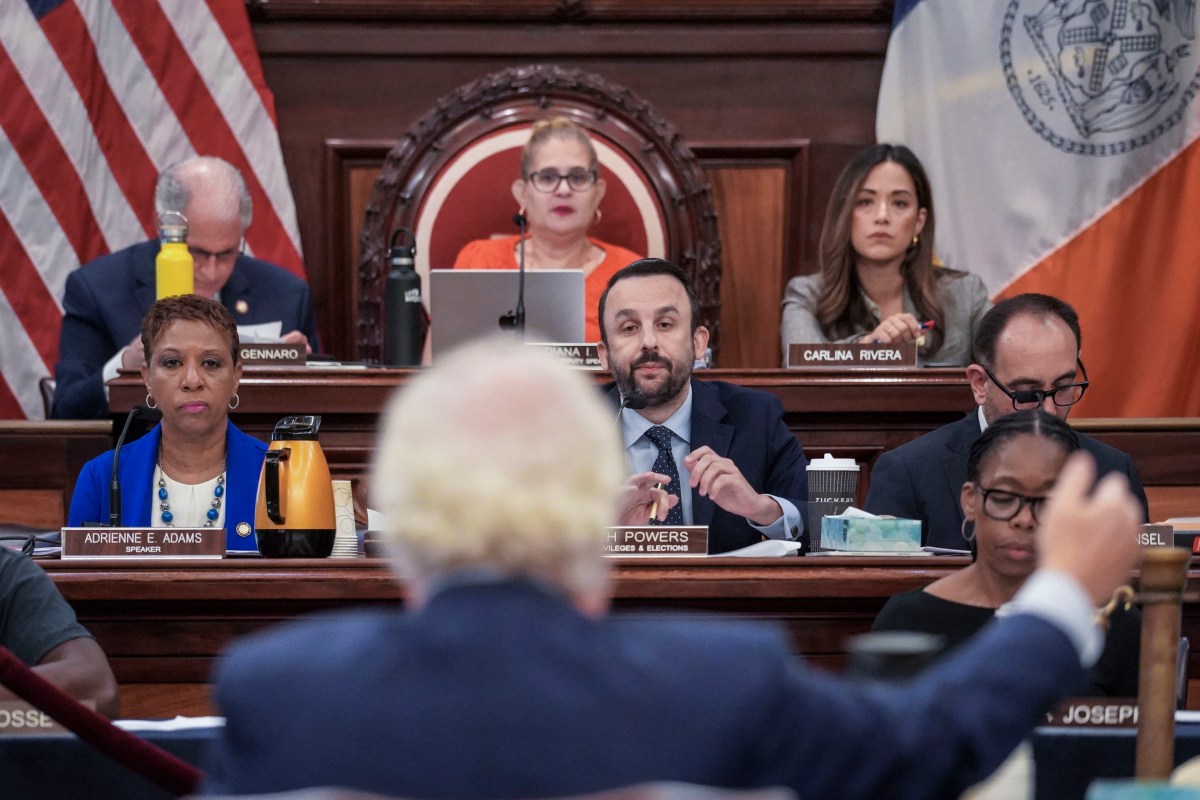
Mastro used his own opening testimony to pitch himself for the job and to attempt to dispel council members’ greatest concerns about his nomination. He emphasized that he is a “lifelong Democrat” who has litigated on behalf of other prominent local Democrats including former Mayor Bill de Blasio and former city Public Advocate Betsy Gotbaum.
Mastro, at multiple points, referenced his work in the Giuliani administration to take down organized crime in the since-closed Fulton Fish Market and in the private carting industry. Additionally, Mastro said that he “personally lobbied” Giuliani and then-Council Speaker Peter Vallone to pass protections for same-sex married couples.
“I put my life on the line for this city,” Mastro said. “I faced death threats from the mob, [I had] two and a half years of police protection, but it was the right thing to do, to stand up to the mafia that had a stranglehold of the Fulton Fish Market and the private carting industry.”
In a bid to show council members that he would be their lawyer as much as the mayor’s, Mastro said that he would have an “open-door policy” and they would have him on “speed dial.” Furthermore, he insisted he will not be beholden to the mayor over the council — insisting “I am my own man.”
When it comes to matters Mastro is currently litigating that could directly impact the city, including a case against the state’s paused congestion pricing toll program and another challenging the city’s buildings emissions cap law, he said he would recuse himself.
‘Shocking and unacceptable’
Yet lawmaker after lawmaker subjected Mastro to tough questions and statements about his time in the Giuliani administration as well as his clients at private law firms.
One of the more heated exchanges during the hearing saw Deputy Council Speaker Diana Ayala press Mastro on his role representing a group of Upper West Side residents opposed to a homeless shelter in the neighborhood’s Lucerne Hotel in 2021. Specifically, she pointed to Mastro’s move to send private investigators disguised as plumbers to take pictures of one of the homeless men living at the hotel — Shams DeBaron — to prove he no longer resided there.
Ayala called the tactic “shocking and unacceptable” and asked Mastro if he would teach such tactics to Law Department attorneys were he to be confirmed as coproration counsel.
“How do you expect the public to trust that you’re gonna conduct litigation on behalf of the city with integrity and protect the dignity and safety of unhoused New Yorkers after that type of incident occurred under your watch?” Ayala said.
Mastro insisted everything that he did was “proper and ethical.” The litigator also pointed to DeBaron telling the news outlet Gothamist on Monday that, despite the incident, he now supports Mastro’s nomination.
In another clash, Council Member Crystal Hudson (D-Brooklyn) asked Mastro on how he “reconciles” working for an administration she characterized as having a direct “negative impact” on Black and brown New Yorkers with his pro-bono racial and social justice legal work.
Mastro responded by insisting he stood out in the Giuliani administration as someone who pushed for social justice policies and initiatives.
“The fact of the matter is that you have a 40-year career to know that I embody those values,” Mastro responded. “And we are focusing only on a four-year period of a 40-year career, and even then, you have hard evidence of how I exemplified, within the confines of being in a support position, those values.”
During a news conference amid the hearing, former Gov. David Paterson — who attended the hearing to testify on Mastro’s behalf — echoed the notion that Mastro tried to go against the tide in the Giuliani administration.
“He was a good link to the Giuliani administration, which I hated, by the way,” Paterson said. “But Randy Mastro is a whole different person. The reason he can’t talk about some of the things that went on in that administration is because he has what I think is one of the most important values that a human being can have: loyalty. He’s loyal.”



